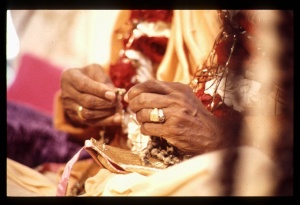SB 8.5.25

A.C. Bhaktivedanta Swami Prabhupada
TEXT 25
- tatrādṛṣṭa-svarūpāya
- śruta-pūrvāya vai prabhuḥ
- stutim abrūta daivībhir
- gīrbhis tv avahitendriyaḥ
SYNONYMS
tatra — there (at the Lord's abode known as Śvetadvīpa); adṛṣṭa-svarūpāya — unto the Supreme Personality of Godhead, who was not seen even by Lord Brahmā; śruta-pūrvāya — but who was heard about from the Vedas; vai — indeed; prabhuḥ — Lord Brahmā; stutim — prayers derived from Vedic literature; abrūta — performed; daivībhiḥ — by prayers mentioned in the Vedic literature or offered by persons strictly following Vedic principles; gīrbhiḥ — by such sound vibrations or songs; tu — then; avahita-indriyaḥ — fixed in mind, without deviation.
TRANSLATION
There [at Śvetadvīpa], Lord Brahmā offered prayers to the Supreme Personality of Godhead, even though he had never seen the Supreme Lord. Simply because Lord Brahmā had heard about the Supreme Personality of Godhead from Vedic literature, with a fixed mind he offered the Lord prayers as written or approved by Vedic literature.
PURPORT
It is said that when Brahmā and the other demigods go to see the Supreme Personality of Godhead in Śvetadvīpa, they cannot directly see Him, but their prayers are heard by the Lord, and the needful action is taken. This we have seen in many instances. The word śruta-pūrvāya is significant. We get experience by directly seeing or by hearing. If it is not possible to see someone directly, we can hear about him from authentic sources. Sometimes people ask whether we can show them God. This is ludicrous. It is not necessary for one to see God before he can accept God. Our sensory perception is always incomplete. Therefore, even if we see God, we may not be able to understand Him. When Kṛṣṇa was on earth, many, many people saw Him but could not understand that He is the Supreme Personality of Godhead. Avajānanti māṁ mūḍhā mānuṣīṁ tanum āśritam (BG 9.11). Even though the rascals and fools saw Kṛṣṇa personally, they could not understand that He is the Supreme Personality of Godhead. Even upon seeing God personally, one who is unfortunate cannot understand Him. Therefore we have to hear about God, Kṛṣṇa, from the authentic Vedic literature and from persons who understand the Vedic version properly. Even though Brahmā had not seen the Supreme Personality of Godhead before, he was confident that the Lord was there in Śvetadvīpa. Thus he took the opportunity to go there and offer prayers to the Lord.
These prayers were not ordinary concocted prayers. Prayers must be approved by Vedic literature, as indicated in this verse by the words daivībhir gīrbhiḥ. In our Kṛṣṇa consciousness movement we do not allow any song that has not been approved or sung by bona fide devotees. We cannot allow cinema songs to be sung in the temple. We generally sing two songs. One is śrī-kṛṣṇa-caitanya prabhu nityānanda śrī-advaita gadādhara śrīvāsādi-gaura-bhakta-vṛnda. This is bona fide. It is always mentioned in the Caitanya-caritāmṛta, and it is accepted by the ācāryas. The other, of course, is the mahā-mantra—Hare Kṛṣṇa, Hare Kṛṣṇa, Kṛṣṇa Kṛṣṇa, Hare Hare/ Hare Rāma, Hare Rāma, Rāma Rāma, Hare Hare. We may also sing the songs of Narottama dāsa Ṭhākura, Bhaktivinoda Ṭhākura and Locana dāsa Ṭhākura, but these two songs—"śrī-kṛṣṇa-caitanya" and the Hare Kṛṣṇa mahā-mantra—are sufficient to please the Supreme Personality of Godhead, although we cannot see Him. Seeing the Lord is not as important as appreciating Him from the authentic literature or the authentic statements of authorized persons.